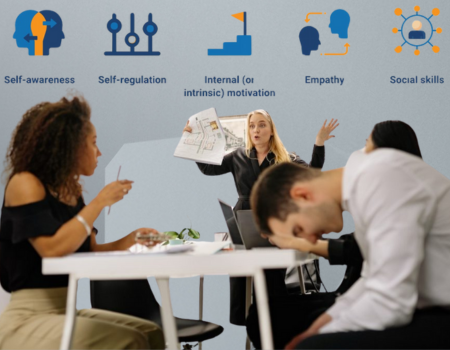Emotional Intelligence for Effective Working Relationships
Speaker: Audrey Halpern
Speaker Designation: Soft Skills Trainer

Speaker: Audrey Halpern
Speaker Designation: Soft Skills Trainer

Emotional intelligence and leadership are closely related concepts. So, it is no wonder that Emotional intelligence is an important indicator of organizational leadership success. Emotional intelligence is a general set of skills that can be applied to anyone and any environment. Understanding EI and mastering the skills involving emotional intelligence will greatly help you and your team in difficult situations.
Emotionally intelligent people are self-aware and alert to the verbal and non-verbal signals of others, ensuring that their communication skills and ability to build relationships are more effective.
It has been shown that Emotional Intelligence or EI, can be even more critical than the power of the cognitive brain usually measured with IQ. In other words, if you want to succeed, you would be much better off working on your soft skills, empathy, communication skills, understanding others, and so on than to become better only at a specific technical skill.
The Emotional Intelligence course presented here aims to familiarize you with EI. So, this course is an introduction to the field.
Emotional Intelligence (EI) also known as Emotional Quotient (EQ) is understood as the ability to understand your own and others’ emotions and how they drive behavior. This capacity to relate appropriately with others, and engage constructively with their emotions is a vital trait for every successful leader.
This webinar will help you identify the practical steps you can take to recognize the 12 signs of emotional intelligence and help you develop your emotional intelligence.
This EI course can pay huge dividends, especially in situations where your teams are under stress due to deadlines, demanding clients, or intense and unproductive meetings.
Emotional Intelligence (EI), often referred to as emotional quotient (EQ), is a critical aspect of interpersonal skills that plays a key role in fostering effective working relationships. It involves the ability to recognize, understand, manage, and effectively use one's own emotions, as well as the ability to perceive and influence the emotions of others.
Emotional Intelligence is particularly valuable in professional settings because it enhances interpersonal communication, helps navigate workplace challenges, and contributes to a positive organizational culture. Individuals with high emotional intelligence are often better equipped to handle stress, build strong relationships, and contribute positively to effective teamwork and leadership. Organizations that prioritize the development of emotional intelligence among their employees often experience improved communication, increased employee engagement, and enhanced overall workplace satisfaction.

Audrey Halpern has had an exemplary 20+yr training facilitation/learning and development career, developing custom soft skills employee programs, on-boarding and Train the Trainer experiences. She is an experienced Facilitator, instructional designer, and learning and development/HR professional with a passion for making a difference. Since 1992, Audrey has been consulting with corporate clients, developing customized content and facilitating soft skills, emotional intelligence, leadership and communication content face to face and through global webinars for clients in a variety of industries.
Previously a Director of Training with a telecom company, she has experience in both management and consulting. She has been an adjunct professor for the MBA program at Hofstra University and New York Institute of Technology where she taught presentation skills/communication skills. She has coached MBA students in successfully navigating their internships.
As a trainer, she utilizes impactful activities to build confidence and essential 21st century skills for individuals and teams to communicate and collaborate effectively. Audrey is a faculty member of the American Management Association in New York where she teaches professional development topics throughout the Northeast.